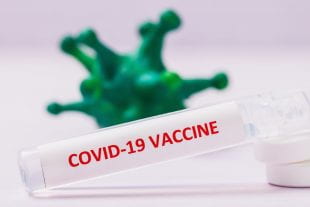Barney Graham '75 and Bill Gruber '75 are key leaders in two of the nation's most advanced COVID-19 vaccine trials, but their paths first crossed nearly 50 years ago when they were randomly selected to room with one another as incoming freshmen at Will Rice College.
In a webcast installment of the President's Lecture Series Oct. 27 as part of Rice's combined homecoming, reunion and families weekend festivities, Graham, deputy director of the National Institute of Allergy and Infectious Diseases' Vaccine Research Center, and Gruber, senior vice president of vaccine clinical research and development at Pfizer, shared stories from their years at Rice and their oft-intersecting careers in medicine, research and vaccine development.
Gruber and Graham were both math majors, but Gruber grew up in suburban Houston and Graham was raised on a Kansas farm.
"I learned how to solve a lot of problems on the farm," he said. "We probably spent half of each day fixing things and solving problems before we could do any work. But when I got to Rice, I had my eyes opened to a whole new level of problem-solving and a whole new level of intensity. And Bill was my role model at that time. Because he had already taken calculus. I had not."
Graham changed majors to biology in his junior year, in part because of an overly theoretical topology course, and partly from a desire to do something "more practical."
Gruber stayed with math, "but all along, was very interested in biology, like Barney. I did a senior thesis in decision theory class that dealt with the approach to diagnosis using Bayesian theory. And what's remarkable to me is, you know, the current COVID-19 trial that we're conducting depends very much on a Bayesian type of analysis. It's sort of full circle."
Gruber went on to medical school at Baylor College of Medicine, and Graham earned a medical degree at the University of Kansas and a Ph.D. at Vanderbilt University. Both became interested in infectious diseases, and Gruber, a pediatric specialist, became particularly interested in respiratory syncytial virus, or RSV, one of the leading causes of infant hospitalization. And he ran into Graham at a scientific meeting.
"I was putting up a poster about respiratory syncytial virus… and who should be putting up a poster next to me but Barney Graham," he said. "I looked over, and he said, 'Are you really interested in this too?' I mean, we had no idea."
Graham said his career was also shaped by HIV. He treated the first AIDS patient in the state of Tennessee and spent years conducting research into a potential vaccine. Both men wound up on Vanderbilt's faculty for several years before Gruber joined Pfizer and Graham left for the National Institutes of Health.
Graham and Gruber each gave details about the COVID-19 vaccines they are helping develop, as well as some of the dozens that are in development in other labs worldwide. They also discussed the clinical trials they are helping lead and the safety of the vaccine development process.
"The question I always get… (is) are you cutting corners?" Gruber said. "Are you doing things that you otherwise wouldn't do that jeopardizes the safety of subjects in the trial or violates the integrity of trials and that sort of thing? And the answer to that is resounding no."
Gruber said all of the steps in vaccine development are being followed for COVID-19. The work is progressing rapidly, he said, because all of the typical delays and waiting between crucial steps have been eliminated since COVID-19 vaccines are "the number one priority."
"This is a place where government, really, I think, doesn't get enough credit, particularly those folks at CBER, which is the Center for Biologics (Evaluation and Research) at the FDA, for working hand-in-hand with academics, with government, with industry to move things forward," Gruber said.
Gruber said it is critical for the public to "feel confident that anything that is licensed will have been proven to be safe and effective."
Graham agreed, saying it is critical to reassure the public that the vaccines are safe. Depending upon the effectiveness of the vaccines, he said it may be necessary to "immunize almost the entire population" in order to achieve the 70% herd immunity that would make COVID-19 a seasonal disease.
"So we're either going to be immunized or infected until our population gets up to that 70% mark," Graham said. "And I think Bill and I would both agree that the vaccine is going to be a lot safer bet than the infection."
Graham and Gruber's presentation is available online at youtu.be/fwjZUXYZG38.

